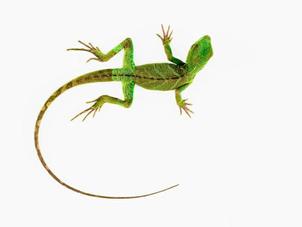|
"I have been through some terrible things in my life, a few of which actually happened." Some variation of this thought is attributed to a dozen different people going back some two-thousand years to Seneca the Younger. Thomas Jefferson, Mark Twain and Dorothy Day wrote something similar. The quote has been restated in modern times by Novelist Russell Hoban. “When you suffer an attack of nerves you're being attacked by the nervous system. What chance has a man got against a system?” At one time or another, we've all felt stymied, even hopeless, facing a heartless system. We can feel the same way when assaulted by our daily worries and fears. Our fear is regulated by a highly complex system in our brains, but that system is archaic, conceived in the Mesozoic era. Can we re-figure our nervous system to better cope with modern life? 
The foundation of our fear-regulatory system is our brain-stem and cerebellum, sometimes referred to as the “reptilian brain.” It's about as savvy as the entire brain of present-day reptiles.
This part of the brain began to emerge in mammals some 200 million years ago, with the specific responsibility for survival. The reptilian brain developed the fight or flight reaction to get the job done. The system helped early life forms remain constantly alert for trouble, and aided in the important dynamic: eat breakfast, don't be eaten for breakfast. 
Over the millennia, the physical and chemical structure of our brains formed a transportation system to automatically react to threats large and small. It's a well-paved freeway with excellent signage to our destination and no speed limit.
Most of the threats we face on a day to day basis, do not require us to run or fight for our lives. They require a high-level system, a system that sees the reptile responses, and bypasses them for a road less traveled, a road that takes the long way around danger, through the neocortex. The neocortex is the most recent evolution of the brain and the site of most higher brain function. Using the neocortex we can better assess danger, and not react to daily concerns and stress as though we were going be eaten for breakfast. Take this archaic early warning system, and add to it the neuropathways we started forming in our own lifetime. As babies we responded to stressful situations such as hunger, or a wet diaper with neurons taking these same super highways in the brain. It's litte wonder we feel we don’t have a chance against the system! You see the system not working for people when they make the same mistakes time and time again. The ruts in their brain are a well-worn track. It’s harder to notice when our own nervous system isn't working to our advantage. Can we be
I was tipped off by a wise older woman twenty years ago, to begin observing myself closely when I started to feel stressed. After practicing this observation for some time, I began to see the moment my reptilian brain leaped into action. A greater length of time later, occasionally I was able to hit the brakes and begin to bushwhack a path to the neocortex.
Neuroscientists say our brains have amazing plasticity, that we’re never too old to forge a new physical and chemical structure in them. With the presence of mind to notice the trickle of anxiety creeping over me, I am learning to relax that little lizard in my brain-stem. When I find myself worrying about what might happen, I can check out how serious the threat really is. I can ask myself it I’m heading down a track formed when I felt like a helpless child, not a capable adult. Each time I’m able to short circuit the fight/flight reaction, the road to my thinking brain gets smoother. Each time I’m able to short circuit the fight/flight reaction, the road to my thinking brain gets smoother.
I've found this a terrific way to deal with my fear of public speaking. When I get the racing heart, sweaty palms and quick breathing, I realize my body is reacting as if I'm Daniel walking into the lions den. Pausing, feeling the fear manifesting in my body, I remind myself I'm not risking my life. The audience is most likely on my side.
Recognizing and allowing fear to just be present gives me the chance to be curious when I feel that leap of adrenaline from my trusty inner lizard. Being curious, is more interesting than going down the same old road to the same old place. What do you think? Can being more present to fear reduce stress? I'd love to hear from you. Comments are closed.
|
I'm fascinated to discover little-known history, stories of people and events that provide a new perspective on why and how things happened, new voices that haven't been heard, insight into how the past brought us here today, and how it might guide us to a better future.
I also post here about my books and feature other authors and their books on compelling and important historical topics. Occasionally, I share what makes me happy, pictures of my garden, recipes I've made, events I've attended, people I've met. I'm always happy to hear from readers in the blog comments, by email or social media. Archives
September 2023
Categories
All
|

